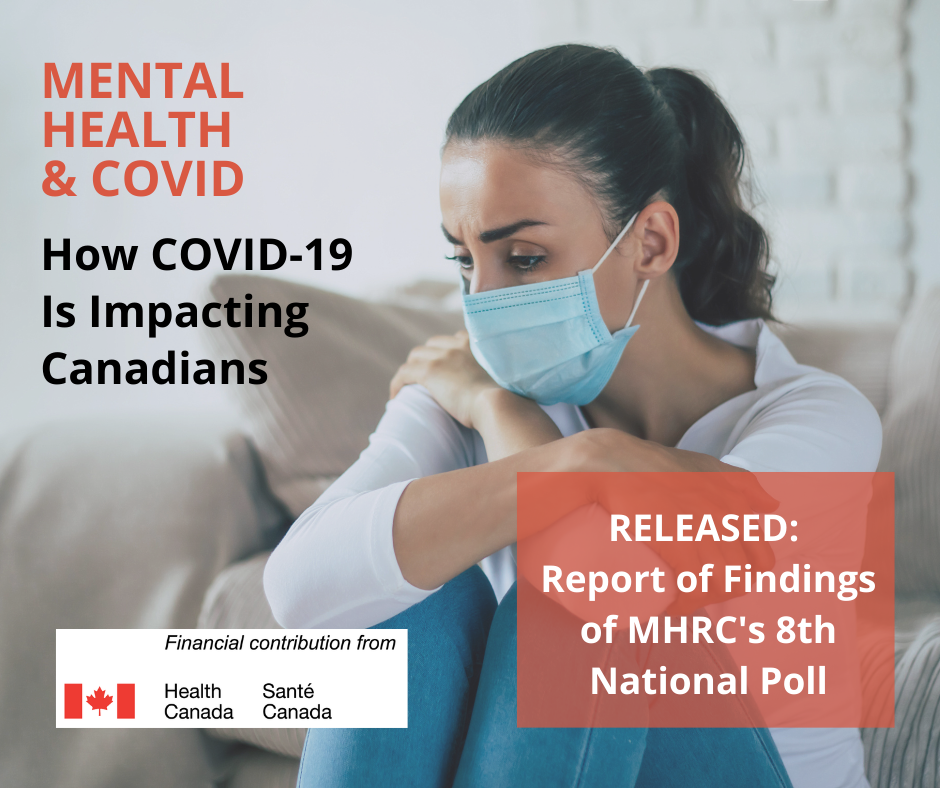Findings of Poll #8
Access the Abridged Report and Full Report of the findings of our eighth national poll
Join us for an in-depth webinar on Monday, September 27th at 1 PM ET discussing findings and answering questions about our eighth national poll.
Unvaccinated people indicated significantly more symptoms of mental distress, as well as higher levels of anxiety and depression compared to vaccinated people as the pandemic progresses and vaccinations go up.
As the first of MHRC’s national polls where most respondents (84%) were double vaccinated, overall levels of self-reported anxiety have remained consistent but a divergence in the self-reported mental health of vaccinated vs. unvaccinated Canadians has been identified.
75% of vaccinated individuals indicated concern about the continuing potential threat of the virus while only 38% of unvaccinated had similar concerns. Unvaccinated individuals indicated significantly higher levels of future anxiety (28%) and depression (26%) looking forward into the next two months of restrictions than the vaccinated population (12% anxiety, 11% depression).
These are some of the key findings of MHRC’s eighth poll in our ongoing series of polls on “Mental Health & COVID: How COVID-19 Is Impacting Canadians.” The poll captures Canadians’ perceptions of their levels of anxiety and depression through the pandemic in order to identify and evaluate the factors that influence mental health.
Alberta replaced Ontario as the province whose citizens indicate the highest levels of self-reported anxiety. This is the first recent poll that Ontario hasn’t led in this metric. Alberta’s outcomes appear to coincide with higher case counts, as opposed to previous polls in which region-based higher anxiety was more associated with lockdown restrictions.
Other major findings of MHRC’s study include:
Suicide ideation is at its highest since April 2021. 14% of Canadians have thought about suicide in the past year, trending upward from 13% in Poll 7 and 12% in Poll 6. Thoughts of suicide are higher among those who live alone, those in the frontline healthcare sector, and those with high-rated anxiety or depression.
1-in-4 (26%) of parents indicate that their children “rarely” or “never” have enough of a chance to socialize with other children in the last month.
One-in-three Canadians (32%) indicate either that they are, or they should be, accessing mental health supports since COVID-19. The increase in service delivery is almost entirely in virtual services (phone, text, online) — 4% of Canadians are accessing services in this way in the year prior to COVID, compared to 14% now.
Data for our ninth poll will be collected in mid to late October.
ABOUT THE STUDY
This study was conducted by Pollara Strategic Insights with an online sample of 3,010 adult Canadians and was conducted between August 17th to 24th, 2021. Results from a probability sample of this size could be considered accurate to within ±1.5 percentage points, 19 times out of 20. Results have been weighted based on age, gender, and region to be representative of the Canadian population.
A series of research briefs that provide an in-depth, specific investigation of our polling results can be found here. Results of earlier polls are compared when applicable.
Findings from Polls 2 to 7 are searchable on our free Data Portal — and the findings of Poll 8 are in the process of being integrated.

